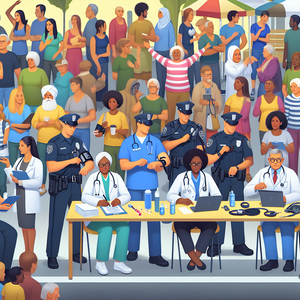The Unsung Heroes of Healthcare: A Day in the Life of an Entry-Level RN Case Manager

The typical day for an entry-level RN case manager is a blend of clinical assessment, care coordination, and communication. Unlike traditional nursing roles that focus heavily on direct patient care, case management requires a broader perspective on health and wellness.
Patient Assessments
Each day often starts with reviewing patient records and assessing their needs. This includes evaluating medical history, understanding current health conditions, and identifying potential barriers to care. For example, an RN case manager might meet with a newly discharged patient to understand their ongoing health issues and ensure they have the necessary resources for recovery. This proactive assessment helps in identifying issues before they escalate, ultimately leading to better health outcomes.
Care Coordination
A significant portion of the day is dedicated to coordinating care among various providers. This involves scheduling follow-up appointments, arranging for home health services, and collaborating with physical therapists or social workers. For instance, if a patient requires rehabilitation after surgery, the case manager will work to ensure that all necessary services are in place for a smooth transition back home. This coordination is critical in preventing readmissions and ensuring continuity of care.
Patient Advocacy
RN case managers often serve as advocates for their patients. They work to ensure that patients understand their treatment plans and have access to the resources they need. This could mean helping a patient navigate insurance challenges or providing education about their medications. For example, case managers often engage patients in discussions about their rights and options, empowering them to make informed decisions regarding their health.
Documentation
Keeping accurate and up-to-date records is essential in case management. RN case managers document every interaction and update care plans as needed. This meticulous attention to detail not only helps in tracking patient progress but also ensures compliance with healthcare regulations. Proper documentation is crucial for effective communication among healthcare providers and can significantly impact the quality of care delivered.
Personal Experiences
To bring these responsibilities to life, consider the story of Sarah, an entry-level RN case manager. On a typical Tuesday, Sarah begins her day by reviewing a list of patients who have recently been discharged from the hospital. She notes that one of her patients, Mr. Johnson, an elderly man with chronic heart failure, has missed a follow-up appointment. Concerned about his health, Sarah calls him to discuss his situation. During their conversation, she discovers that he lacks transportation and is unsure about his medication regimen. Sarah quickly springs into action, arranging for a rideshare service to get Mr. Johnson to his appointment and scheduling a virtual consultation with his physician to clarify his medication instructions. This proactive approach not only alleviates Mr. Johnson's anxiety but also significantly impacts his health by ensuring he receives the care he needs. Such stories highlight the real-world impact of RN case managers and their ability to enhance patient experiences and outcomes.
Challenges Faced
While the role of an RN case manager is rewarding, it is not without challenges. Entry-level professionals often face a steep learning curve as they adapt to the demands of the position. Balancing caseloads can be tough, especially when managing complex cases with multiple stakeholders. Additionally, navigating the intricacies of insurance policies and healthcare regulations can be daunting. Moreover, emotional resilience is essential. RN case managers frequently interact with patients facing difficult circumstances, and it's crucial to maintain a supportive demeanor while managing their own emotional responses. The ability to remain compassionate and effective under pressure is a hallmark of successful case managers.
The work of entry-level RN case managers is vital in bridging the gap between patients and the healthcare system. By offering support, coordination, and advocacy, these professionals play a significant role in enhancing patient outcomes. As we shine a light on their daily responsibilities and the challenges they face, it becomes clear that RN case managers are indeed the unsung heroes of healthcare. For those considering a career in nursing, exploring the field of case management offers an enriching opportunity to make a meaningful difference in the lives of patients and the community at large.
Healthcare Case Manager
Hospitals, rehabilitation centers, and insurance companies
Core Responsibilities
Develop and implement individualized care plans based on patient assessments and needs.
Collaborate with multidisciplinary teams to ensure comprehensive patient care and follow-up.
Monitor patient progress and adjust care plans as necessary to meet health goals.
Required Skills
Strong communication and interpersonal skills to interact with patients and healthcare providers.
Proficiency in electronic health record (EHR) systems for documentation and tracking.
Understanding of healthcare regulations and insurance processes.
Clinical Nurse Specialist (CNS) in Case Management
Hospitals, specialty clinics, and healthcare organizations focused on quality improvement
Core Responsibilities
Provide expert clinical guidance and education to nursing staff and other healthcare professionals.
Assess and evaluate patient care practices to improve outcomes and enhance quality of care.
Lead initiatives to streamline case management processes and reduce readmission rates.
Required Skills
Advanced nursing knowledge in a specific clinical area (e.g., cardiology, oncology).
Leadership abilities to mentor and train nursing staff.
Strong analytical skills for data interpretation and quality improvement.
Social Worker in Healthcare
Hospitals, outpatient clinics, and community health organizations
Core Responsibilities
Conduct psychosocial assessments to identify patient needs and barriers to care.
Advocate for patients by connecting them to community resources and support services.
Facilitate communication between healthcare providers and patients to ensure holistic care.
Required Skills
Strong counseling skills and empathy to support patients through challenging situations.
Knowledge of local health services, community resources, and social welfare programs.
Ability to navigate complex healthcare systems and insurance for patient advocacy.
Patient Care Coordinator
Healthcare systems, private practices, and outpatient facilities
Core Responsibilities
Schedule appointments and coordinate care among multiple healthcare providers.
Assist patients in understanding their treatment plans and managing their appointments.
Ensure proper documentation and follow-up on patient care plans.
Required Skills
Excellent organizational and multitasking abilities for managing patient loads.
Strong customer service skills to engage with patients and families effectively.
Familiarity with medical terminology and healthcare software systems.
Health Services Manager
Hospitals, outpatient clinics, and long-term care facilities
Core Responsibilities
Oversee the administrative functions of a healthcare facility, focusing on case management services.
Develop policies and procedures to enhance operational efficiency and patient care.
Analyze financial and operational data to improve the quality of services provided.
Required Skills
Strong leadership and management skills to guide teams in a healthcare setting.
Knowledge of healthcare laws, regulations, and compliance standards.
Proficiency in data analysis and healthcare management software.


